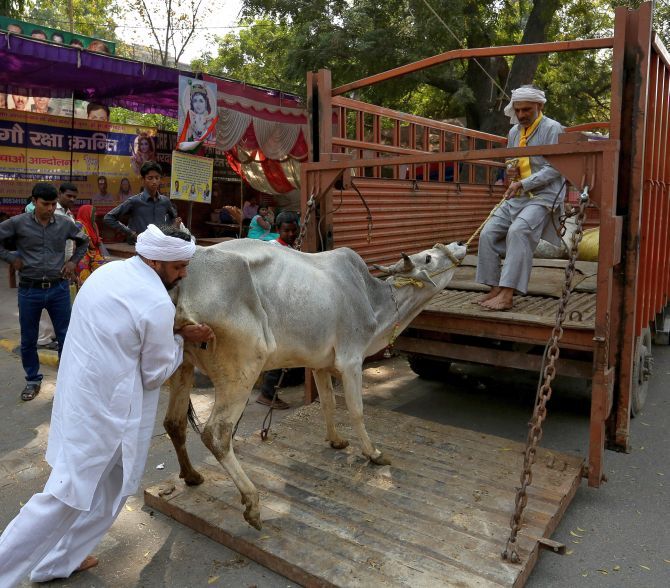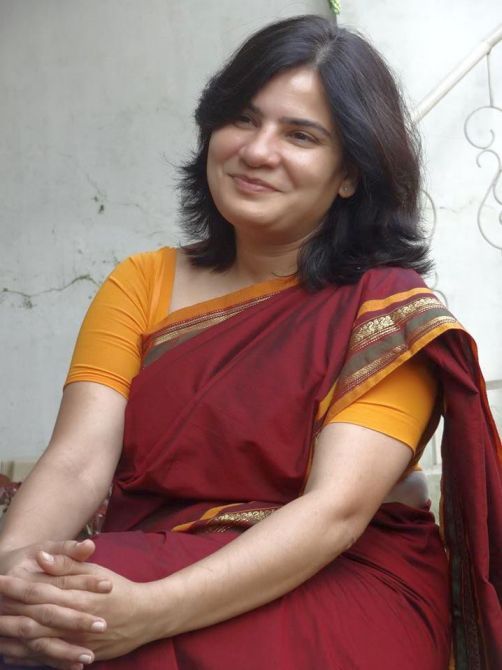 | « Back to article | Print this article |
'If a majority of the country's population is sentimental about a certain species, why are we so ashamed to say that we want to give it statutory protection?' asks animal rights activist Gauri Maulekhi, in a conversation with Manavi Kapur.

"Perhaps the only time I fainted was when I first saw a maggot-infested dog during a roadside first-aid camp for animals in Lucknow." All of 17 then, Gauri Maulekhi remembers that day in 1994 clearly for good reason -- she poetically fell into a pile of cow dung.
A year later, she would catch the eye of Maneka Gandhi, the chairperson of People for Animals, an animal rights, rescue and shelter NGO.
"She gave me certain tasks and cruelty cases to address. The next time she visited Lucknow, I apprised her of the progress," says Maulekhi.
There was no looking back after that. Now a trustee of PFA and the adviser to Gandhi, the women and child development minister, Maulekhi has come a long way since that roadside camp.
She is the force behind the hotly debated legislation against cow slaughter in the country, among several other controversial cases, including seeking a ban on the bull-taming sport of Jallikattu in Tamil Nadu.
Inside her office in New Delhi’s Shastri Bhavan, Maulekhi occupies a large table on one end of the room. The rest of the space is filled with filing cabinets, a table piled with documents and couches that have a small basket, bags with pet food and more paperwork.
The pet food explains itself with a white cat curled up on a chair across Maulekhi’s desk.
"Sassy," she says nodding in the direction of the cat, "is a rescued cat. I have 35 others, 26 disabled or rescued equines and nine dogs at my home in Dehradun."
While her position at the ministry of women and child development requires her to be in Delhi, she says she ‘WhatsApp manages’ her rescued pets with her staff in Dehradun.
Born and brought up in a business family in Lucknow, Maulekhi tried her hand at several professions before becoming a full-time animal rights activist.
After completing school at Loretto Convent, Lucknow, she acquired a Bachelors in Commerce and a Bachelors in Education from Lucknow University.
For close to five years, she worked as a teacher-counsellor at St Columba's School in Delhi.
She then worked with a software company in Noida, before trying her hand at being a radio-jockey, a voice-over artiste and reciting audio books for leading publishers such as Penguin.
“But my heart was always with working for animals. I was actively running campaigns wherever I was, in whatever time my job allowed me.” At 22, she gave up meat. “Everyone in my family is now vegetarian,” she says.
The proverbial moment of reckoning came after Maulekhi moved to Dehradun and began working with the local PFA unit there.
“Mrs Gandhi urged me to look into the suffering of animals that get sacrificed for the appeasement of gods, which is when I started focussing on policy and judiciary to save animals,” she says.
 Maulekhi, left, says that at the time, there were no funds to hire a good lawyer and so she chose to represent that case herself in front of the Uttarakhand high court bench. She prepared herself with diligent readings of law books and took help from lawyer friends about court procedures.
Maulekhi, left, says that at the time, there were no funds to hire a good lawyer and so she chose to represent that case herself in front of the Uttarakhand high court bench. She prepared herself with diligent readings of law books and took help from lawyer friends about court procedures.
“I even Googled how to behave in court,” she says.
The result was a favourable order from the high court in 2011 that said, ‘We, accordingly, conclude the matter and direct the state and its agencies to ensure that no destruction / killing / sacrifice of any nature of any animal takes place outside a registered or licensed slaughter house…’
A wall-hanging of the Char Dham Yatra in Uttarakhand hangs tellingly over Maulekhi’s desk in Shastri Bhavan.
This was to be the first of the nearly 45 cases she would file.
The one that has made the most headlines is Gauri Maulekhi vs Union of India and others, which seeks a ban on the illegal export of cattle for the Gadhimai Mela in Nepal.
This is the case that opened up several avenues for the legislation on banning the slaughter of cattle and sits squarely at the centre of the storm surrounding a ban on the sale of beef.
The case also appears within the context of cow vigilantism and the mob killings of those suspected to be eating beef or transporting cattle for slaughter.
Murmurings among meat exporters and cattle farm owners suggest that the PFA is behind mobilising the vigilante activities across the country. When asked, Maulekhi shakes her head in disagreement.
“PFA has one million volunteers and we don’t do a police background check on everyone. Besides, I find this entire debate frustratingly lopsided and exaggerated,” she says, adding, “Hundreds of police officers and security personnel are mowed down by cattle smugglers every year. But we only choose to report the lynchings. I do not condone any violence, under any circumstances, but the larger picture is as important.”
However, a leading meat exporter who requests not to be named, said, “She may call us biased, but in reality, Maulekhi’s allegiance to the Bharatiya Janata Party is clear in the kind of legislation she chooses to fight. It is a clear attack on one community, a large portion of which relies on meat trade for sustenance.”
Maulekhi minces no words when it comes to the issue of saving the cow.
“If a majority population of the country is sentimental about a certain species, why are we so ashamed to say that we want to give it statutory protection?” she asks.
“The pseudo-secularism that we are encouraging is very dangerous and it tilts scales in a lopsided manner. I’m absolutely not hesitant to say I am a Hindu and I stand by Hindu beliefs, especially non-violence that is the bedrock of Indian culture.”
To balance the religious aspect of the cattle debate, Maulekhi brings in facts and figures about how cattle smugglers are eventually funding terror activities, and how the ‘white revolution’ led to a gross commercialisation of cattle and agriculture.
“The dairy industry is absolved of its responsibility to reasonably and responsibly dispose its by-product, the dry cows and calves. It uses these animals and palms them off to butchers as soon as it becomes uneconomical to keep them,” she says.
The ‘white revolution’, or Operation Flood, was the world’s largest dairy development programme launched under the Indira Gandhi administration in 1970.
Being critical of the Congress's previous policies and agendas also appears to be the mood of the hour.
“An attack on cattle is an attack on the culture of the country. While there were protests in Tamil Nadu against the ban on Jallikattu as it was seen as a threat to their culture, we must understand that it was still a regional phenomenon. Protection of cattle is in the spirit of India,” she says.
A large green binder with ‘Gadhimai’ written in bold letter is kept on top of one of the filing cabinet. Other binders include those on elephants, Animal Care Society and Vaishno Devi.
While her office is just steps away from Gandhi’s, there is little that Maulekhi seems to have to do with the women and child development ministry. Though her smile does not fade, her stance hardens a bit when asked about her work with the ministry, considering all her time is taken up by PFA campaigns and court cases.
“Considering my experience with children when I was working with the school, I am assigned specific projects from time to time,” she explains.
So, could this position eventually mean that she is to pursue a political career?
She chuckles. “If animals had voting rights and if they had a say in Parliament, I would become a politician.”
Mincing words does not seem to be something Maulekhi subscribes to.